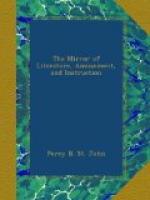I think I can, in some degree, account for the fashion these composers have gained, and why, I fear, they are likely to maintain it. It is that the public have become too musical. Every female, from the highest to the lowest, whose parents can purchase a piano-forte, and pay a master, must learn music; the number of teachers and pupils are multiplied without end; and out of either class how many are there qualified by nature as singers? Not two in fifty. What follows? By labour and attention science may be acquired, although voice cannot. The voiceless teacher may instruct his voiceless pupil in the foppery of an art, the spirit of which is unattainable by either; pieces merely scientific are placed by him on her piano—are performed to the credit of both, with vast execution, as far as respects the science and the harmony—–but as for the singing, as singing ought to be, ’tis
“Worse than the howling of Irish wolves against the moon.”
Well—Miss, from the expense and pains bestowed upon her, must, of course, be the musical oracle of the family; the father must forego his favourite old songs, written by “honest Harry Carey,” (as Ritson insists on his being called); the mother is laughed to scorn if she mentions “Auld Robin Gray,” “Mary’s Dream,” “Oh, Nanny, wilt thou gang wi’ me?”—or such obsolete stuff;—and even the brothers, who might stickle a little for Moore’s melodies,
“With thoughts that breathe and words that burn,”
are silenced with, “Pooh! any body can sing them.”
Thus is the family taste made up; and this extends to the patronage of singers in the style alone deemed correct, as it is the quantity of public patronage which must influence the manager of either theatre or concert in the persons he engages. And thus has the great extension of musical taste been injurious to music.
But, to return to our old favourite. All who remember him must likewise remember his powers of attraction ere this blight of fashion had come over us. Witness his various benefits, and above all, that at the Opera House, producing, it is said, 1,500_l_. Such marks of public favour, added to the constant request of company, both public and private, and to a man who, like Incledon, loved his art, were sure to be productive of vanity—vanity, the besetting sin of all great men, from Alexander on his Persian throne, to Mr. Kean enthroned in the Coal Hole.—His education had been limited. The songs chiefly in vogue at the early part of the late war were nautical, which led him to a bold, free style; these were his faults—vanity, want of cultivation, and a freedom of manner approaching to excess. But he had a qualification as a singer which threw all these into shade. The “Spectator,” I believe, somewhere says it is necessary for a good dancer to have a good understanding; but I think it is much more necessary for a good singer to have a good and feeling heart; and whether singing or acting his part in the drama of life, with family, friends, or brother (not forgetting sister) performers, Charles Incledon had as warm a heart as ever beat.




